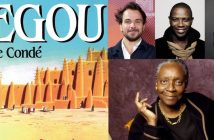In this film, there is tension that Hitchcock would have appreciated. Yet, Daratt is a film in which there is practically no music or dialogue and in which time is drawn out. But the heat of the dry season stimulates sensations and creates static in the air. Young Atim wants to avenge for his father by killing his murderer. Inside of him, he carries a rage that knows no bounds but is fuelled from afar: because the’Justice and Truth’ commission grants a general amnesty to the terrible acts of violence committed in Chad, his grandfather gives him a gun to kill the torturer Nassara. But it is difficult for him to cold-bloodedly kill this man who has become a pious and generous baker. In human reality, killing isn’t as spectacularly obvious as in boom-boom cinema. While revenge is a dish best eaten cold, the colder it is, the less revenge is obvious. Atim agrees to be hired by Nassara who progressively thinks of him as his own son. He is then trapped in a vicious circle: from then on, what is important is not whether he will kill him or not, but how he will get out of this; in short, how he will solve the delicate equation of his own survival, up till the dazzling closing scene.
For everything to converge to this finale, this duel behind closed doors was necessary; this specifically physical choreography miming a confrontation in which each of them scrutinizes, sizes up and tames the other. Here, the director of Abouna develops his great sense of images where the lighting, the colours, the arrangement of bodies in the depth of field and the minimalist set combine to serve a story all in shades and sensitivity. The sparse mise en scène and editing permanently sustain the tension. Nassara hovers around Atim as much as Atim runs after him, and the camera draws closer to their faces, to their eyes: they never stop observing each other, trying to pick a quarrel, even smelling each other, trying to lead the other in a bullfight, in which they have nothing in common but the weight of blood.
But they share much more than that: by taking the risk of a complex relationship, Nassara restores to Atim (which means orphan) the father figure that he took away from him before his birth, a man he can confront. By welcoming him into his home, he renews the father-mother-son trio that he himself broke. A delicate proximity establishes itself between Atim and his young wife, forced into marriage by her family. While in Atim and Nassara’s duel only their interchangeable clothes stand out against a background of ochre walls and ground, Aïcha is nothing but colours of life. She will pay a high price for the unquiet she generates. Couldn’t she have been a way out for Atim?
However, the blood conflict can only be resolved between Atim and Nassara. Death has already been delivered: should it be repeated? Vengeance is as deadly to yourself as to your victim; it’s a vicious circle that turns you into your enemy. Atim doesn’t know that but he can sense it, confronted with this terribly human character for whom the still-present violence runs alongside regret and fragility. There he is, plunged even deeper into complexity, as the relationship becomes a place of initiation. Nassara would like to bring Atim to religion, the solution he found to ease his conscience, or simply tame him by taking the risk of exposing himself, but Atim resists: the father’s ghost keeps them apart, and their inability to say things out loud. Yet, while Nassara is not able to actually confess to Atim, he hands down his expertise: « Without love, there is no good bread ». It’s when Atim makes a success of his batch that the film changes its course and acknowledges the possibility of filiation.
Indeed, it is definitely in terms of transmission that Haroun raises the question of how to break the vicious circle of violence. The question of forgiveness is not raised in terms of a Christian vision that is too quick to forget to solve Atim’s equation; it doesn’t help him to manage the burden of heritage. Because it is certainly a killing mission that he has to get out of. Forgetting is not erasing but inventing. And the only way for him to invent his own future is by escaping the binary duel between Nassara and the grandfather whom Atim only represents. His name is Abatcha, symbolic father to the Chadians, in this country fighting a civil war since 1965, where the same hatred is repeated eternally. It’s by asserting himself as a third thinking party that Atim opens a new door: the strictly speaking theatrical staging that Haroun elaborates at the end of the film allows him to give another meaning to his action. He creates a symbolic image that allows him to exist as such. Although just following an individual destiny, the director- who has experienced war in his flesh- offers us a real political program: getting out of duality, restoring the excluded third person embodied by Atim, he who takes action, so that he can do it in full control of his decisions. And thus get out of the impasse that is the vicious repetition of violence and hatred.
It’s making a courageous choice and Atim doesn’t lack it, he who confronts head-on the man he thinks he hates. Contrary to what macho supporters of active vengeance will think, his choice is not a cowardly one: he refuses to be an object, a hostage to binarity, in order to become a subject, capable of defining his own future. It was necessary to go through the confrontation with this fundamental otherness- his father’s murderer- but by building his own image in the film’s last ritual, he is able to solve this tension. This image, the fiction of Atim at last master of his future, is the condition to mourning and the solution to getting over the barbarity. And it’s because Haroun believes in the power of fiction that he imparts the film with such great moral strength, the ability to create a utopia.
Far from going round in circles, this individual approach is the precondition for living together, the condition for justice and reconciliation on the scale of the nation. But it is also, for those beyond Chad’s frontiers, a learning process towards a culture of peace. That’s what makes this film, impressive by its mastery and maturity, served by amazing non-professional actors, crowned by the Special Jury Prize at the Mostra, Venice’s prestigious festival, a central work, useful and necessary to the present time.








